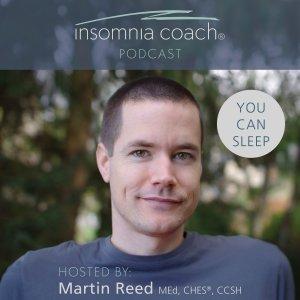Insomnia Coach® Podcast

Everything you need to know about cognitive behavioral therapy for insomnia (#1)
Listen to the podcast episode (audio only) I talk a lot about cognitive behavioral therapy for insomnia (CBT-I) in this podcast. This episode will explain exactly what CBT-I is and how it helps improve sleep. The audio from this episode was taken from a Facebook Live, originally recorded in May 2019. You can find the Insomnia Coach Facebook page at facebook.com/insomniacoach. Click here for a full transcript of this episode.Click here to hide the transcript. Welcome to the Insomnia Coach podcast. My name is Martin Reed. I believe that nobody needs to live with chronic insomnia and that cognitive behavioral therapy for insomnia (CBT-I) techniques can help you enjoy better sleep for the rest of your life. I just want to talk a little bit about CBT-I, what it is, why it's the best treatment, certainly the best long-term treatment for chronic insomnia, just because I think that we're still really struggling with getting the awareness of CBT-I out there and what it is, what it means. I just want to say this right from the start, that CBT is not CBD. It's not a marijuana product or cannabis product. CBT-I is a collection of skills. Anyway, with that out of the way, let's get going. CBT stands for cognitive behavioral therapy for insomnia. Now it's not therapy in the traditional sense of the word. It probably gives you these ideas that you're lying on a couch with your hand on head, eyes closed, just recounting all your fears and worries. It's not really therapy in that traditional kind of stereotypical idea that we have around therapy. What CBT-I is, is a collection of techniques or skills that you can implement that effectively retrain you to trust your sleep system again, and over time this reduces any sleep related worries. It also helps you identify and address and fix any behaviors that you might be implementing in an attempt to kind of compensate for bad sleep or lost sleep, that can actually perpetuate insomnia or make the problem worse. CBT-I also helps correct any unrealistic thoughts or incorrect thoughts that you might have about your sleep or unrealistic expectations that you have around sleep. The usually just end up putting extra pressure on you. You feel like, "Oh, I've really got to get these eight hours of sleep," for example. And that in itself makes sleep more difficult. With that being said, there are some core components of CBT-I. All practitioners generally follow a similar pattern in terms of how they implement or the actual components that they're using, but they might just have slightly different philosophies as to the best way to encourage people to observe the techniques and the components. But generally speaking, it won't vary that much from provider to provider, because they're all evidence-based techniques. With that being said, what I would like to do is just talk about how I approach CBT-I. Now, with my company, InsomniaCoach.com I offer a phone coaching package and also offer an online course. I'm going to talk about the online course, primarily, because it's more structured. It helps me use that as an example for how we introduce each stage of CBT-I and what's involved. When I work with new clients, they generally like to start with sleep education, and that's just because all of us, I'm not talking specifically about people with insomnia here, but virtually everyone has unrealistic expectations or beliefs about sleep. Most of us don't really understand what sleep is or what normal sleep is. I like to start off with sleep education, just to kind of challenge any incorrect thoughts or assumptions about sleep,






 Visit Podcast Website
Visit Podcast Website RSS Podcast Feed
RSS Podcast Feed Subscribe
Subscribe
 Add to MyCast
Add to MyCast